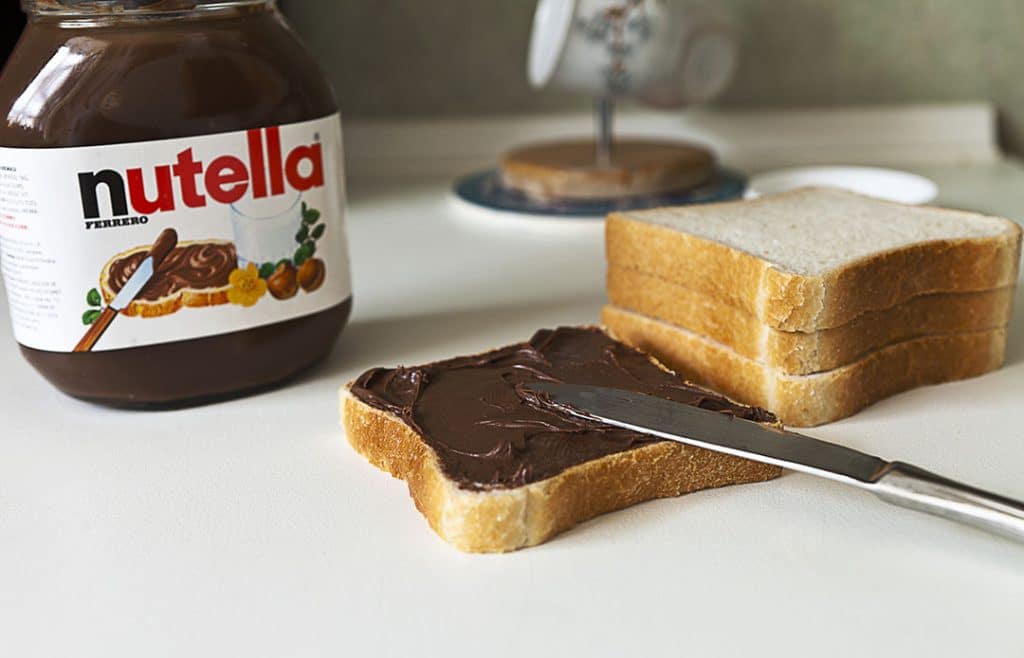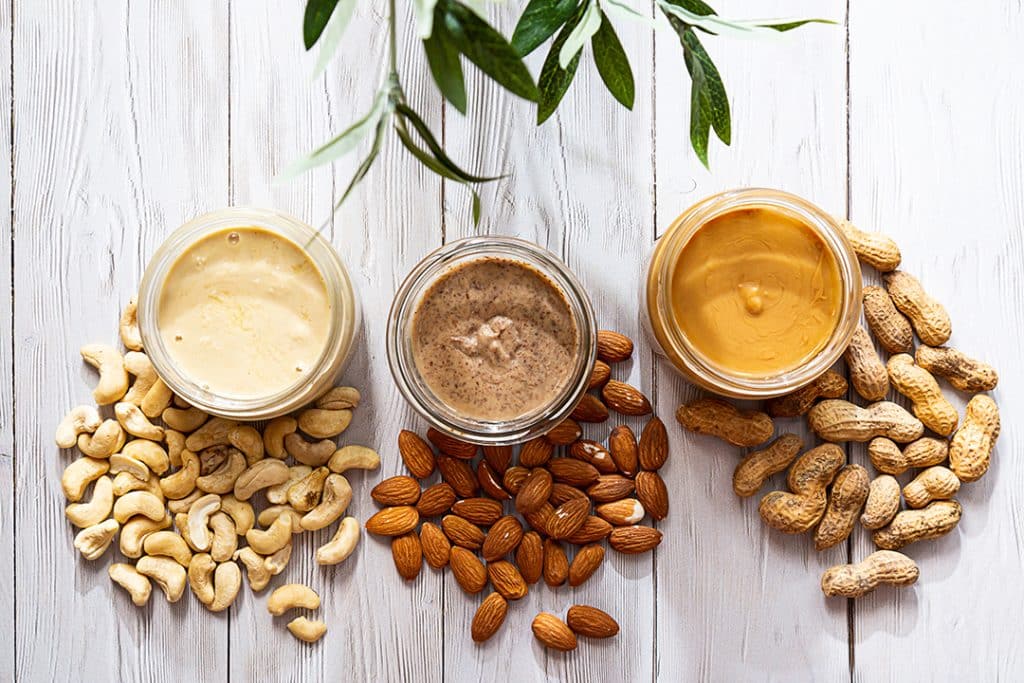Nut butters have grown in popularity over the years. But are products like Nutella really a healthier option to peanut butter or other popular snacks?
Chocolatey, nutty, creamy…it’s no wonder the popular spread, Nutella, has become a go-to snack for adults and kids, alike. And since it’s made with hazelnuts, Nutella must be healthy, right?
While Nutella is a tempting treat, it’s just that – a treat. Read on to learn why this “nut” spread isn’t the healthy snack it’s cracked up to be (and which nut butters will actually do your body good).
What is Nutella?

Nutella is a brand of a sweetened hazelnut cocoa spread that is adored around the world.
Its origins trace back to post-World War II Italy, where cocoa was in short supply. Pietro Ferrero, a pastry maker from Piedmont, ingeniously created a paste made from hazelnuts, sugar, and a hint of cocoa to satisfy the craving for chocolate. His concoction was initially shaped into a loaf that could be sliced and served on bread, but evolved over time into the creamy spread we know today.
Since 1964, Nutella has become a staple snack in many kitchens after winning over tastebuds and being marketed as a “quick” and “healthy” breakfast or snack option.
Is Nutella Healthy?
Nutella is delicious. But sadly, it’s not the healthy snack option many people hope it to be. Despite its association with breakfast and the fact that it does contain real hazelnuts and cocoa, Nutella cannot be considered a health food – or even a traditional nut butter…
Nutella Isn’t Really a Nut Butter
Nut butter, by definition, should primarily consist of nuts. When you shop for quality peanut butter or almond butter, for instance, the first (and sometimes only) ingredient on the nutritional label will say “peanuts” or “almonds.”
With Nutella, the first ingredient listed is sugar, followed by palm oil, hazelnuts, cocoa, and skim milk. The high content of sugar and palm oil means it is technically closer to a candy than a nut butter.
What’s In Nutella?
Unlike many processed foods, Nutella only contains 7 ingredients: sugar, milk, palm oil, cocoa, hazelnuts, lecithin and vanillin. While this is a plus, the downside is that the bulk of your chocolatey spread is made of sugar and palm oil.
Basic Nutrition Facts
A serving of Nutella (2 tablespoons, or 37 grams) contains approximately:
- Calories: 200
- Fat: 12 grams
- Sugar: 21 grams
- Protein: 2 grams
Now, let’s compare this to half of a Snicker’s bar (which is about the same weight in grams as 2 tablespoons of Nutella):
- Calories: 180
- Fat: 9 grams
- Sugar: 18 grams
- Protein: 2 grams
As you can see, a serving of Nutella has a similar nutritional value as half a candy bar – but with slightly more fat, sugar, and calories. And that’s before you spread it over anything else.
Nutella vs. Peanut Butter: Which is Healthier?
Now, let’s compare Nutella to a different common snack: peanut butter. Peanut butter, especially the natural kinds without added sugars or oils, primarily consists of peanuts. A similar serving size (2 tablespoons) is richer in protein and healthy fats, and lower in sugar than Nutella.
- Calories: 188
- Fat: 16 grams
- Sugar: 2 grams
- Protein: 7 grams
While Nutella may be a delicious treat, its high sugar and fat content disqualify it from being considered a healthy nut butter. Opting for nut butters (like peanut butter) with minimal added sugars and oils will offer more nutritional benefits and make a much healthier snack choice.
Healthy Nut Butter Alternatives

Nutella may not be the healthy nut butter you hoped it would be, but that doesn’t mean there aren’t other delicious and nutritious options for you! In fact, there are plenty of healthy nut butter alternatives to snack on (and some that even satisfy your sweet tooth).
What is a Nut Butter?
A nut butter is a spreadable snack made by grinding raw or toasted nuts into a paste. A true healthy nut butter should be prepared with simple ingredients, ideally just nuts, and possibly a bit of salt for flavor.
It’s important to avoid nut butters made with added hydrogenated oils. These are typically added to enhance the smooth spreadability (and may even say “no stir”). However, hydrogenated oils have a negative impact on your heart health and can increase “bad” LDL cholesterol.
Watch out for brands that include excessive added sugars or artificial preservatives, too, as these additives can detract from the nut butter’s nutritional benefits and can contribute to issues like weight gain, diabetes, and other health issues.
Types of Nut Butters
Nut butters make a delicious snack and fill us up with healthy fats and protein. Here are some of the best nut butters to snack on or cook with.
> Peanut Butter
Peanut butter is one of the most popular types of nut butter – and often a childhood favorite! When choosing a healthy peanut butter, look for brands that contain only peanuts and perhaps a pinch of salt. Avoid those classic creamy varieties that contain added sugar and oils.
Peanut butter is a good source of protein, magnesium, and phosphorus, which can support good bone health and energy production. Plus, it’s an extremely versatile kitchen staple; you can spread it on toast or incorporate it into sauces and smoothies.
> Almond Butter
Almond butter, made from ground almonds, is a great source of vitamin E, magnesium, and fiber. It has a slightly sweeter taste compared to savory peanut butter. It also contains monounsaturated fats which can help lower cholesterol levels and reduce the risk of heart disease. Almond butter works well as a spread, in baking, or added to oatmeal and smoothies.
> Cashew Butter
If you love a creamy nut butter, cashew butter may be the one for you. It has a sweet flavor and is rich in iron, zinc, and magnesium. These nutrients support immune function, vision, and bone health. It’s particularly high in unsaturated fats which supports your heart health. Cashew butter is excellent in desserts, curries, and as a spread.
> Hazelnut Butter
Hazelnut butter is made from pureed hazelnuts and has the rich, indulgent flavor that makes Nutella so popular. It’s a good source of vitamin E, a key nutrient for skin health and protecting cells from oxidative damage.
> Seed Butter
While seed butters aren’t technically nut butters, they offer a similar healthy snack for those with nut allergies (or who simply want to enjoy the benefits of seeds!).
- Sunflower Seed Butter
Made from sunflower seeds, sunflower seed butter has a nutty flavor and is a good source of vitamin E, magnesium, and selenium – an antioxidant that supports immune function. - Pumpkin Seed Butter
Pumpkin seeds are rich in zinc, magnesium, and healthy fats. With pumpkin seed butter, you can up your levels of these key nutrients and enjoy this unique, earthy, green-hued butter. It works great in smoothies, spreads, and salad dressings. - Sesame Seed Butter (Tahini)
Tahini is a versatile ingredient made from ground sesame seeds. This spread is rich in calcium, iron, and healthy fats and plays a crucial role in Mediterranean and Middle Eastern cuisines. Use it in delicious dressings, dips (like hummus), and baked goods.
The Healthiest Nut Butters
From supporting weight management to enhancing overall nutritional intake, there’s a nut butter out there to meet your needs and palate.
> Best Overall Nut Butter: Almond Butter
While any of the healthy nut butters above make a great addition to your daily diet, almond butter tends to be the most nutritious. It is high in monounsaturated fats, vitamin E, magnesium, and fiber. Almond butter not only supports heart health but also contains antioxidants that help protect your cells from oxidative damage. Its balance of protein and healthy fats makes it a healthy way to satisfy your hunger and boost your energy.
Based on your unique health concerns and nutritional gaps, however there may be a better “healthiest” nut butter for you. Reach out to an AlignLife functional nutritionist to find out which nut butter balances your diet best.
> Best Nut Butter for Protein: Peanut Butter
When it comes to protein content, peanut butter reigns supreme. A 2-tablespoon serving of peanut butter clocks in with about 8g of protein (with almond butter and sunflower seed butter coming in second with 7g).
> Best for Weight Loss: Powdered Peanut Butter
If you’re looking to satisfy your cravings with a lower-calorie option, look to powdered peanut butter. This powdered version is made by pressing out most of the natural oils from roasted peanuts and then grinding the nuts into a powder. This process significantly reduces the fat content (usually by 85% or so) while maintaining the high levels of protein. Use powdered peanut butter in smoothies, over yogurt, or mix with water and spread like the traditional version.
> Best Nut Butter for Kids: Sunflower Seed Butter
With its creamy texture and subtle flavor, sunflower seed butter is a top choice for kids. It’s packed with nutrients that support childhood growth and development (such as vitamin E, magnesium, and selenium). It’s also lower in saturated fats compared to some nut butters and can be a more allergy-friendly option, making it a great addition to any school lunchbox.
Healthier Ways to Get Your Nutella Fix

Nut or seed butters make an easy, tasty snack when hunger strikes. But what if you crave that chocolatey sweetness that Nutella offers? Here are a few ways to get your chocolatey fix:
- Top your favorite nut or seed butter with dark chocolate chips.
- Make chocolate peanut butter energy bites.
- Blend up a chocolatey peanut butter protein smoothie.
- Make your own “Healthy Nutella.”
Go Nuts for Natural Nut Butters

Nutella can be a nice treat once in a while. But for everyday snacking, reach instead for healthy nut butters like natural peanut butter or almond butter. These nut butters make a fulfilling snack packed with proteins, healthy fats, fiber, vitamins, and minerals and won’t sabotage your healthy diet.
Looking for more healthy eating inspiration?
Try some of our favorite recipes, or schedule a visit with an AlignLife near you. You’ll learn more about how proper nutrition can help you live healthier – from managing pain to losing weight to reaching your health goals.



